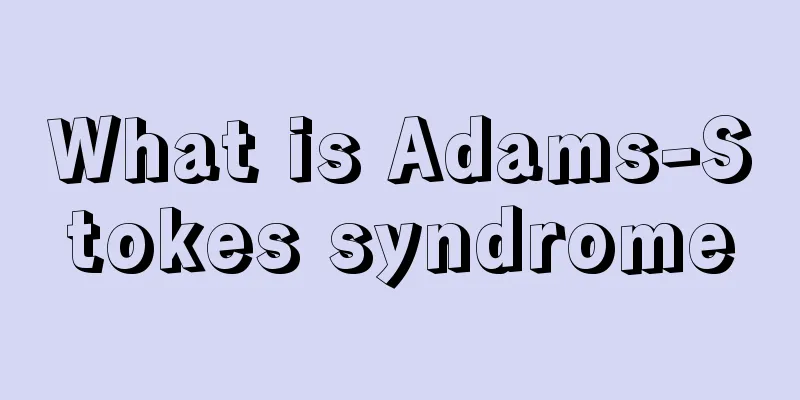What is Adams-Stokes syndrome

|
Many friends are unfamiliar with the disease called Adams-Stokes syndrome. So what is Adams-Stokes syndrome? Next, this article will introduce you to the relevant content of Adams-Stokes syndrome for your reference only. Friends who want to know what Adams-Stokes syndrome is, you may want to take a look! Please see the detailed introduction below. Adams-Stokes syndrome, also known as cardiogenic cerebral ischemic syndrome, refers to the sudden onset of severe, fatal slow or fast arrhythmias, which causes a sharp drop in cardiac output in a short period of time, resulting in symptoms such as severe cerebral ischemia, loss of consciousness and syncope. Adams-Stokes syndrome is a clinical syndrome characterized by acute cerebral ischemic attack caused by sudden changes in heart rate. This syndrome is not related to changes in body position and is often caused by syncope due to a sudden and severe tachycardia or bradycardia. How is Adams-Stokes syndrome treated? For those with a slow heart rate, the heart rate should be accelerated, and atropine and isoproterenol are often used. If the cause is complete or high-degree atrioventricular block, bifascicular block, or sick sinus syndrome, an artificial pacemaker should be implanted. For those with a fast heart rate, electrical cardioversion may be performed. For patients with supraventricular or wide QRS complex that cannot be distinguished as ventricular or supraventricular, amiodarone or propafenone should be used. For patients with ventricular tachycardia, lidocaine is the first choice except for torsades de pointes. 1. When a syncope patient is found 1. The patient should be placed in a head-down, feet-up position immediately to ensure adequate blood supply to the brain. The patient's clothes should be unbuttoned and the head should be turned to one side to prevent the tongue from falling back and blocking the airway. 2. Do not feed or give water during a fainting attack. Do not let the patient stand up immediately after he regains consciousness. Wait until the patient's general weakness improves before letting him stand and walk gradually under careful care. 2. Syncope caused by bradycardia Drugs that increase the heart rate may be used, or an artificial pacemaker may be implanted. 3. Syncope caused by tachycardia Antiarrhythmic drugs may be used. For ventricular arrhythmias including frequent or multi-source ventricular premature contractions, ventricular tachycardia, ventricular flutter, ventricular fibrillation, etc., lidocaine is usually the first choice, followed by propafenone, amiodarone, etc. In units with conditions, electrical cardioversion can be the first choice. Syncope caused by polymorphic ventricular tachycardia (torsades de pointes) caused by QT interval prolongation Except for lidocaine, which can be tried, antiarrhythmic drugs that prolong repolarization are contraindicated, including all class Ia and class III antiarrhythmic drugs. Usually, drugs that increase the heart rate, such as isoproterenol or atropine, should be given; if this is ineffective, artificial cardiac pacing can be used to ensure a ventricular rate of 100 to 120 beats per minute. For syncope caused by polymorphic ventricular tachycardia with normal QT interval due to myocardial ischemia, in addition to treating the cause, routine treatment for ventricular tachycardia can be used. For polymorphic ventricular tachycardia with extremely short coupling intervals, intravenous verapamil (Isopamil) is effective. 5. Syncope caused by acute obstruction of cardiac blood discharge Advise patients to avoid strenuous exercise to prevent syncope; if there are surgical indications, surgical treatment should be performed as soon as possible. 6. Treatment of the cause After the cause of cardiogenic syncope is determined, treatment should be targeted at the cause, such as correcting water, electrolyte and acid-base imbalances and improving myocardial ischemia. In addition, attention should be paid to certain diseases that require urgent rescue, such as cerebral hemorrhage, myocardial infarction, arrhythmia and aortic dissection. The above is an introduction to what Adams-Stokes syndrome is. I believe that after reading the above introduction, everyone has a certain understanding of the relevant knowledge about Adams-Stokes syndrome. From the above introduction, we can know that Adderall-Stahl syndrome is a relatively serious disease. Therefore, for friends suffering from Adderall-Stahl syndrome, they must go to the hospital for treatment in time. |
<<: What is the reason for high average hemoglobin level
>>: What are the complications after femoral head replacement surgery
Recommend
What harm does the battery do to the human body
Batteries facilitate people's travel and elec...
What are the evidences for identifying cholangiocarcinoma
Because the early symptoms of bile duct cancer ar...
What is the cause of varicose veins in the right lower limb?
Varicose veins on the right lower limb is a very ...
How to choose a hospital for rectal cancer treatment
The selection criteria for rectal cancer hospital...
How much folic acid should I supplement every day to prepare for pregnancy?
Women who are preparing to become pregnant, as we...
What causes cervical spondylosis?
I believe that most of my friends are aware of ce...
How to treat seborrheic dermatitis?
Many friends will encounter different diseases in...
Why can’t you sleep on your right side during pregnancy?
Normally people don't pay too much attention ...
Rice wine fermentation temperature
The fermentation of rice wine is very critical, w...
Why does my face feel numb?
Facial numbness is a very common phenomenon. If t...
Things to note in life for patients with uterine cancer
The emergence of endometrial cancer has brought s...
What are the causes of nasopharyngeal cancer
Nowadays, more and more people are suffering from...
Can sweet wine eggs be eaten on an empty stomach? What is the nutritional value?
When it comes to sweet wine eggs, girls will defi...
What are the effects and functions of azithromycin?
In life, people will inevitably encounter poor he...
Introduction: Is lung cancer metastasis to the liver contagious?
Lung cancer is a highly malignant disease. Among ...









